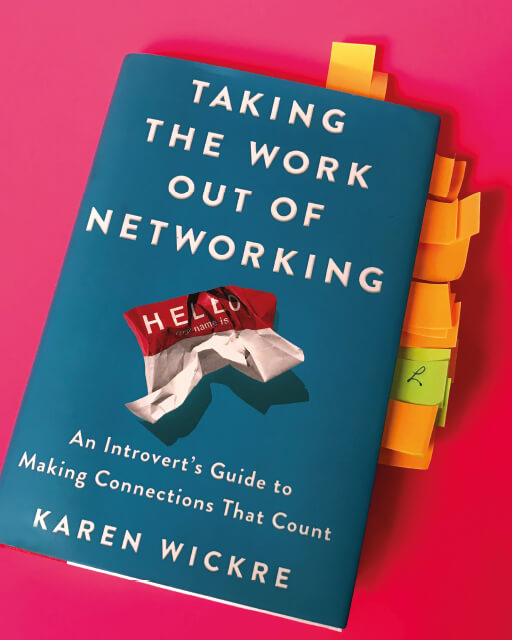IS KAREN WICKRE’S BOOK WORTH READING?
Taking the work
out of networking
“An introvert’s guide to making valuable connections” –
is the subtitle of this book. The author is not alone in this
because right at the beginning of the book she describes that many people
felt uneasy just at the word networking.
Karen Wickre is a journalist and was an editor at Twitter and Google for many years. She is well acquainted with Silicon Valley, but at 68 she does not fit the usual cliché of employees in social media companies.
She prefers to avoid company parties and feels uncomfortable intruding into a conversation or talking extensively about herself. Nevertheless, she is interested in people, loves to find out more about them in conversation and has worked successfully as a freelancer for many years in addition to her jobs at Twitter and Google.
She openly admits that what she looks forward to most at an event is going back home and being alone.
The reasons she lists right at the beginning of her book as a result of research as to why most people simply hate networks are significant:
“Networking is perceived as dishonest”
“The compulsion to engage in superficial conversations with someone one is unlikely to forget in a moment, for the sole purpose, in the name of a personal interest, of gaining information that one could then potentially use in a business context.”
The alternative to the networking superstar
The master of networking is someone who manages with apparent ease to work through the room of a meeting or celebration from start to finish in order to contact all important or supposedly important attendees, exchange business cards and then close the event long before it is over leave and rush to the next event.
We have all observed and perhaps even envied him or her. She could never do that, says Karen Wickre and still makes a plea for networking, which she believes is indispensable in a working life that involves more and more job changes, relocations and insecurities.
From their point of view, introverts usually show greater interest in their fellow human beings and are therefore particularly well suited to building up a network of contacts that can open up decisive information, important advice or a contact for a new professional situation in an important situation .
From her point of view, the most important prerequisite for successful networking is an interest in other people.
Her tips are simple:
Start by asking your counterpart questions.
Show interest in the other person and try to find out more background information about what you have previously researched about the person.
The important filters of social media
And this is where the most important networking tool for introverts appears for the first time in her book: the internet and social media. Not surprising given her work in Silicon Valley.
However, Karen Wickre’s approach differs fundamentally from superficial clicks and fast pace, the predominant character traits with which many social media are associated and frequently used. She recommends a long-term approach and openness to new contacts and means the following:
Be open
It is often the unusual contacts that lead to success over time (or across four corners). She therefore recommends being as open as possible in all directions and investing a cup of coffee or two in getting to know a contact who doesn’t seem to fit into your own scheme at all at the beginning.
Even a negative experience helps
Perhaps, with a negative experience, you gain experience relatively early on about what you don’t want, for example which industry you don’t want to work in or which club you won’t find friends in. At the same time, this attitude reduces the pressure of expectations that keeps many from even trying to network.
Be helpful
Karen Wickre advocates always being helpful with inquiries of all kinds instead of ignoring them or dismissing them with a sentence. At the same time, she recommends paying close attention to how the other person deals with it.
The author advises immediately removing someone from your environment (and address book) who only takes advantage of your helpfulness but does nothing in return, or who does not even inform you about the progress or success of your advice or recommendation.
Never forget the word thank you
Much of what Karen Wickre describes in her book takes time, the most precious commodity we all possess.
It is therefore understandable that from their point of view a thank you is the least that anyone can expect in successful networking and what everyone should take the time to do in return.
Good old coffee drinking or “walk and talk” in New York City
For the author, the electronic connection is an important auxiliary function for filtering. With a positive experience, often over a long period of time via electronic media, nothing is as important as getting to know each other personally, even if it’s just for the famous cup of coffee or a short walk together.
A personal contact does not always develop into a long-term cooperation in the same company – from Karen Wickre’s point of view, the most stable connection, often spanning decades, because “whoever was once in the trenches together”, personal meetings are still an important part of networking .
Keeping in touch is easy and important when you don’t need it
Karen Wickre recommends staying in touch over many years. Not with enormous effort, but rather in a relaxed but always helpful way. She uses almost every morning and evening to maintain her contacts, to answer inquiries and to create contacts between two previously strangers.
Keeping in touch is easy and important when you don’t need it. But, it is the important prerequisite for networks to really lead to a goal at the moment when it is necessary. Her mantra is “You have to build it when you don’t need it”.
No pain no gain
The GloriousMe verdict is: Very worth reading for everyone who believes they can do without networks and for introverts who find “working on a room” dreadful. But also for everyone who thinks they are so busy that they don’t have time to spare. From the author’s point of view, women in particular tend to neglect networking.
The author gives very detailed tips and suggestions on how to use the individual social media networks such as LinkedIn, Twitter, Instagram, etc., what they can and cannot do.
Her recommendations are not only limited to social media, she also describes which tactics are helpful at congresses or company events, right down to concrete formulations that can be understood as suggestions.
But you have to take the time to read the 192 pages of the book. But even the list of sources in this book is interesting and suggests that the author also practices what she herself recommends: no pain, no gain.
The author’s career in Silicon Valley, she also describes her setbacks in economic downturns, her successes and the experiences gained from them make the realistic and helpful advice in this book worth reading for both young professionals and the fifty pluses. She has specific advice for both of them at the end of the book.
Please let GloriousMe (contact@gloriousme.net) know if you found this book review helpful. Many Thanks.
ung#Product Placement#IndependentRecommendation#BecauseWeLoveIt




